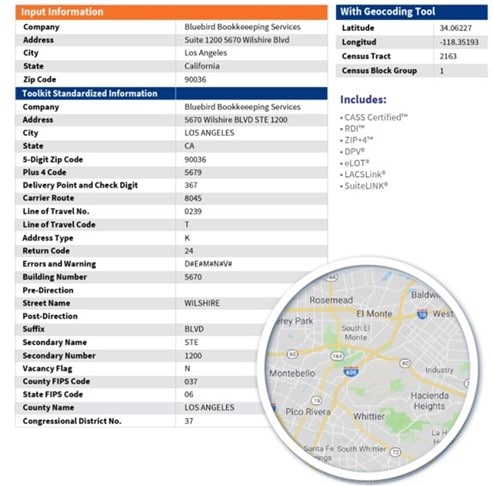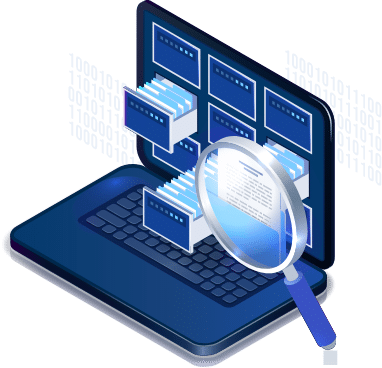Matching addresses to assign location coordinates is vital for lead or customer outreach campaigns or shipping orders for businesses. While scripting methods can be used to geolocate coordinates against an authoritative database, they usually fail to process data beyond a few thousand records.
An address matching software, however, has the pre-built features and capabilities to identify and match variations across multiple data sources at a fraction of the time. In this post, we will look at:
- What is an address matching tool?
- What are its benefits?
- When to choose a manual scripting tool vs. an address matching tool
What is an Address Matching Software?
Address matching refers to the pairing of location coordinates (such as longitude, latitude, ZIP+4 values) with addresses contained in a database or list to ensure if they refer to the same location or not.
An address matching software is an off-the-shelf tool with out-of-the-box features and enhancements to convert spatial reference data (e.g., street, parcels, city, ZIP codes, etc.) with addresses and vice versa at scale.
Address Matching vs. Address Verification vs. Address Standardization
While address matching tools are used interchangeably with geocoding tools, address matching shouldn’t be confused with address verification (verifying addresses against a database such as USPS) or address standardization (modifying and parsing formats in line with USPS guidelines).
Since the terms are closely related, an address matching tool will also provide address verification and address standardization features. For more information, please read
A Quick Guide to Address Verification and Standardization.
Fuzzy Matching vs. Exact Matching
Matching addresses is often a process of checking if two records share the same formatting and spelling to determine a match. This is known as ‘exact’ matching as shown below.

Table 1
However, fuzzy matching tends to be more effective in picking up variations in spelling, formatting, punctuation, and a variety of other data anomalies to accurately pinpoint if two or multiple addresses are one and the same or not.
As shown in Table 2 below, fuzzy matching determines a match despite there being disparities in both name and address records.

Table 2
An address matching solution must incorporate fuzzy logic algorithms to easily identify variations in address data for standardization and deduplication.
Benefits of Address Matching
Using either exact or fuzzy or a blend of both, address matching can be an efficient method for organizations to improve mail campaign effectiveness and increase return on marketing investments. Here is how it can do so:
- Minimize turnaround time: deduping multiple addresses and finding master records can help improve the time taken to verify addresses and carry out a campaign.
- Reduce mailing costs: improved list data can reduce returned mails to wrong or non-existent addresses and eliminate the costs in using promotional materials and in mailing and delivering items.
- Improved customer service and satisfaction: higher mailing accuracy resulting from accurate and clean data can lead to quicker deliveries which can improve brand perception and customer loyalty.
- Save time on managing customer complaints: companies can also avoid losing a substantial amount of time spent on managing missed or late deliveries by getting customer service and marketing teams on board.
Manual Scripts vs. Address Matching Software: Which One Should You Choose?
There isn’t a single method to perform address matching.
On the one hand, you have scripts available in programming languages (such as Python, SQL, R, and Java) that let you match addresses with greater control and flexibility. On the other hand, you have address matching tools that come with a suite of preprocessing and matching configurations.
When it comes to scale, ease, and complexity, address matching tools are a better alternative. Let’s look at this in more detail.
Address Matching Scripts
Utilizing scripts in Python, SQL, Java or R can be effective in matching addresses for small datasets at little or no costs. Users can easily avail scripts developed by other users and tweak it to suit individual matching scenarios as well as manipulate threshold levels to yield more false positives for further review.
However, this manual approach to address has certain limitations including:
- Requires language proficiency: the learning curve can be quite steep for users with no prior knowledge of programming languages. Hence, the user must be well-versed enough to run scripts to ensure any alterations work according to the intended outcomes.
- Cannot process data at scale: manual scripts usually tend not to work as efficiently as needed for matching data across millions of records or for data contained in disparate sources.
- Takes far more time: it can take longer to get accurate results with scripts owing to the amount of preprocessing involved in cleansing and standardization. The more complex the data; the more time it takes.
Address Matching Tools
Despite generally being more costly, address matching tools are best suited for matching addresses spread across multiple and disparate sources in far less time. Here are a few reasons why:
- Out-of-the-box integrations: address matching tools have integrations to various relational databases as well as Excel files, CRMs, and APIs to enable optimized data integration and matching which can save considerable development resources in developing native connectivity in-house.
- Multiple matching approaches: apart from fuzzy matching, dedicate address matching software also incorporate phonetic matching that can be useful in matching specific string address information such as apartment name, city, state, and county name.
- Intuitive, easy-to-use interface: Matching tools have dedicated and user-friendly profiling, cleansing, and standardization solutions to enable users to seamlessly preprocess data prior to the actual matching without needing any coding or domain-specific expertise.
DataMatch Enterprise for Address Matching

Figure 1
Data Ladder’s DataMatch Enterprise (DME) is an enterprise-grade address matching software which has been designed to accurately resolve incomplete, duplicate, and missing address records. Here are a few key features of DME’s address matching prowess.
- CASS-certified solution: address matching against built-in USPS database along with geocoding DPV, LACSLink, SuiteLINK, and more for high-precision accuracy.
- Real-time and batch matching: DME lets you compute intelligent fuzzy, phonetic and exact matches as automated workflows in real-time or time-based batch processes.
- Breadth of data preprocessing features: enables users to intuitively cleanse anomalies and parse address fields into smaller increments such as street name, street number, street suffix, and much more.
For more information on matching addresses using DME, please click here for a free trial or get in touch with our sales team.










































